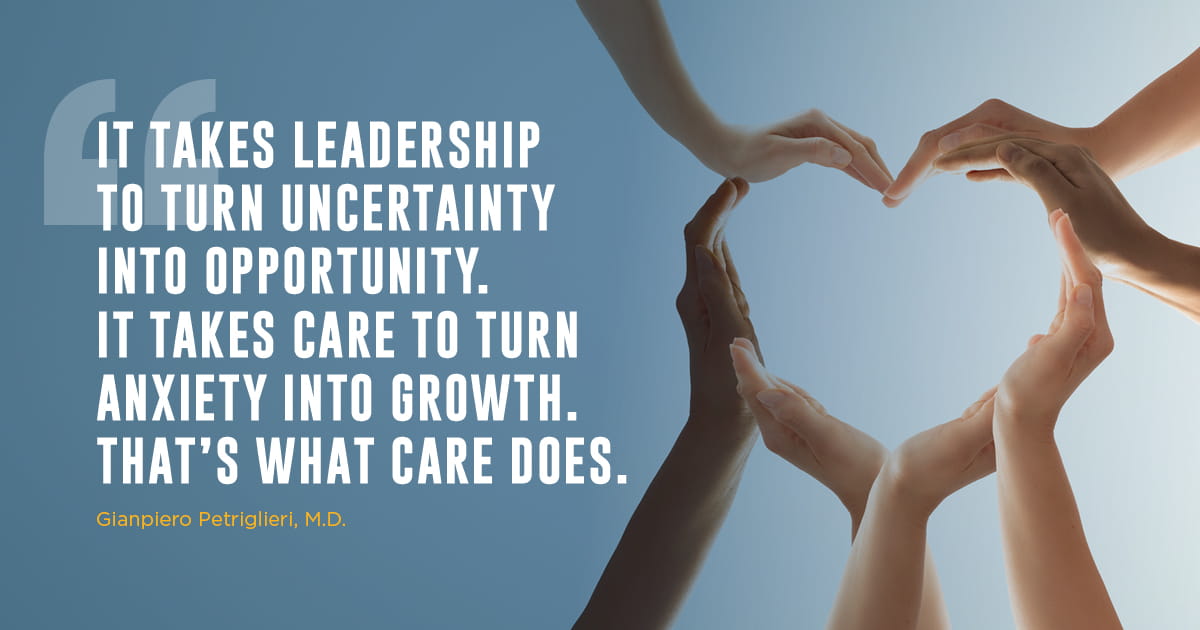Finding fulfillment in a year of uncertainty: Top takeaways from our time with Gianpiero Petriglieri
West Monroe’s 2021 Employee Listening Session series kicked off with a discussion led by leadership and workplace expert Gianpiero Petriglieri, M.D.
West Monroe started a series of Employee Listening Sessions last year to provide support during the pandemic and high-profile racial injustices. We use them to show up for one another, offer support, and lead with compassion. These sessions, led by various external experts, covered such topics as mental health first aid, impostorism, caregiving during COVID, and microaggressions in the workplace. Given resoundingly positive reception of last year’s Employee Listening Sessions, we are continuing to offer new sessions in 2021.
To kick off 2021, our first Employee Listening Session -- “Finding Fulfillment After a Year of Uncertainty”—was facilitated by Gianpiero Petriglieri, an Associate Professor of Organizational Behavior at INSEAD and an expert of leadership and learning in the workplace. He’s a regular contributor for the Harvard Business Review and was recently featured in Gwyneth Paltrow’s Goop podcast.
It was a spirited discussion on the loss we’ve felt and silver linings of the past year, how our changing relationship with work makes work crises more personal, and what we should look for in leaders during troubling times. Here are our top takeaways from the session.
When work becomes personal, and work goes through a profound shift, we experience existential anxiety
There’s been a shift over the past several years to what Dr. Petriglieri calls “nomadic professionals.” Nomadic professionals are deeply and personally attached to the work they do, though less loyal to the organizations they work for. For us, our sense of self-worth and fulfillment is deeply tied to our performance at work. That means, in times of great change in the workplace, when the past is untenable but the future is uncertain, we experience something akin to a midlife crisis. One of the reasons many of us feel despondent and exhausted is that we are collectively experiencing a “work midlife crisis.”
People tend to react to a midlife crisis in two ways – one, they double down and work as hard as possible to try to dig themselves back out and ‘get back to normal’. We’re seeing spikes of productivity across industries right now, but it comes at a cost. A recent study by Aetna found that their members’ top concern was not COVID, it was mental health.
And two, they reinvent. What can we take from this experience to help reinvent how we work? Can we create a more humane way of working?
We need four connections—people, place, practice, and purpose—to successfully transition out of our ‘work midlife crisis’
Dr. Petriglieri identified four kinds of connections that help people feel fulfilled at work: place, people, practice, and purpose. The physical office bundled these four points of connection for many of us—you had organic interactions with coworkers on a daily basis who could support you, you had a certain place where work was done, you had practices and routines tied to work (such as a commute), and you had a sense working toward something. Now, you have to set up a Zoom meeting just to have coffee with someone, you are working from the same place you eat dinner (or even sleep!), your routines are disrupted, and it may leave you asking yourself, “What’s the point?” It’s critical to pay attention to these four areas and rethink how these connection points work in our new way of working to feel fulfilled—and this is where leadership can make a difference.
The core of exceptional leadership is care, particularly in a crisis
Dr. Petriglieri asked participants to reflect on a time when we experienced good leadership and how we knew at that moment the person was being a good leader. Turns out, that’s really hard to define. Sure, you can come up with a list of what leadership is – maybe a position of power or certain virtues. But it’s hard to describe what the experience is unless someone has shown it to you.
So how do leaders show leadership? Dr. Petriglieri suggests leaders must care.
Putting care at the center of leadership requires two simple actions—first, pay attention. Leaders tend to be focused on the future, but during a crisis is the time to focus on the present and what people need today. Second, have a conversation—talk about what you need to pay attention to now. Look at both who or what needs more care, and who or what is thriving as a result. By focusing on care, your people will feel supported and a more sustainable level of performance will likely follow. Leaders were forced to focus on caring for employees ahead of the bottom line in many cases last year, and those that did actually saw increases in performance, fulfillment, and culture.
It may be time to throw out the to-do list we leaders love, and instead maintain a “to care” and a “to cultivate” list instead. As Dr. Petriglieri said in closing, “It takes leadership to turn uncertainty into opportunity. It takes care to turn anxiety into growth. That’s what care does.”


